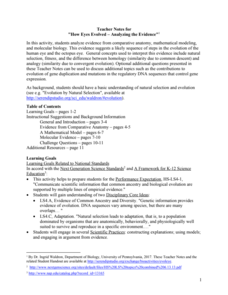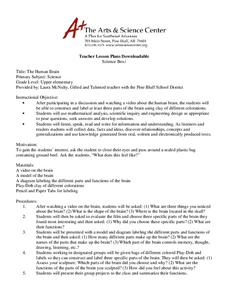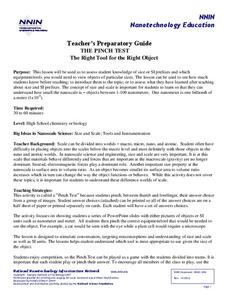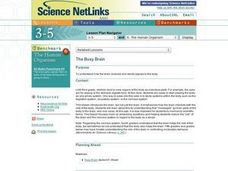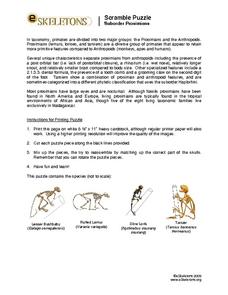Curated OER
Eyes On Me
Students investigate the human eye. In this biology lesson, students read the book Look At Your Eyes and locate the various parts of their eye. Students play the game "I Spy."
Curated OER
Entering the Eye
The human eye is the focus of this biology PowerPoint. The presentation takes a virtual trip inside of the human eye and allows learners to view the various parts of the eye. The best part (for me) are all of the optical illusions that...
Rochester Institute of Technology
Artificial Eye
Scientists in California developed a bionic eye that allows blind people to see edges of objects in black and white and costs $145,000. In the activity, groups of scholars discuss bioengineering, focusing on the human eye. They then...
Tinybop
The Human Body
Examine the systems of the human body with a bold, charming, and kid-friendly application. This noteworthy tool is certain to get kids interested what goes on inside of them! The eye feature uses the tablet camera to view images and show...
Serendip
How Eyes Evolved – Analyzing the Evidence
Octopodes existed for hundreds of thousands of years before humans, yet our eyes share many similarities. Scholars analyze the evidence to determine if the evolution of eyes best fits a homology or analogy model. They discuss the issue...
LABScI
Vision Lab: The Eye
Our bodies have some amazing capabilities, but there are some limitations. Explore the limitations of the human eye through the eighth lab activity in a series of 12 biology lessons. Individuals measure their own peripheral vision and...
Curated OER
How Are the Eyes of Different Organisms Adapted for Sight?
Young scholars compare/contrast the human eye to two other organisms. They use micro viewers to identify the human eye structures, complete a Venn diagram worksheet, identify the function of each eye structure, and answer discussion...
Curated OER
Vision and Optics: Light and Lenses
Students gain a conceptual comprehension of the functioning of the Human Eye in relation to optics and optical vision correction. They explore optics with light sources and various lenses, relating these to visual acuity, accommodation,...
Curated OER
Superhumans & Bionics; Electronic Eyes
Learners examine the anatomy of the eye and the physiology of vision. Students participate in a modeling activity to demonstrate the difference between a healthy eye and an eye affected by macular degeneration. Learners match part of...
Curated OER
What is the Anatomy of the Visual System?
Students research the structures and functions of the eye. In small groups they dissect a model of the human eye, identify structures of the eye, and describe the functions of the photoreceptors.
Curated OER
The Human Brain
Students identify parts of the human brain. In this biology instructional activity, students watch a video about the human brain. Students use different colors of clay to construct and label the three parts of the brain.
Curated OER
Human Body Simon Says
Students display their new knowledge of human body parts' names and locations, by playing an adaptation of the game Simon Says. A more sophisticated version of the game can be played with older students as they learn more specific names...
Curated OER
Sensory and Motor Mechanisms
Advanced biology pupils name the function of each individual structure on figures of the eye and the ear. They describe the purpose of the skeleton and how it works with the muscles to create movement. Finally, they label a large diagram...
National Nanotechnology Infrastructure Network
The Pinch Test
Test your pupils' understanding of the scale from macro to atomic. While displaying images of different materials, learners identify what they would need to make that material visible. Their choices range from the human eye to an...
Curated OER
Why Do People Fall in Love?
Students discuss human behavior, sexual selection and the underlying genetic and evolutionary reasons for mate selection. The, in groups, they rate the attractiveness of certain individuals and measure facial features for symmetry.
Curated OER
Introduction to Biology
Students participate in a variety of activities to introduce them to biology. In this biology lesson plan, students use microscopes, discover bacteria, view human anatomy, and more.
Curated OER
The Eye and Color Images
Students study the eye. In this biology lesson plan, students observe and experiment with visual images as they learn about the basic parts of the eye. Students also demonstrate how an image is projected upon the retinal network.
Curated OER
Growing Eyeballs
Pupils investigate vision and the anatomy of the human eye. They complete a Webquest, watch a video about the structure of the eye, take an online quiz, answer discussion questions, and read newspaper articles about activities that...
Biology Corner
Pipe Cleaner Babies
Ever been told you have your father's eyes? How did it happen? Young biologists get a hands-on experience in meiotic gene expression with a fun pairs-based activity. Participants use pipe cleaner chromosomes with trait beads to make...
Curated OER
Eye Spy
Fourth graders examine how the human eye receives and transmits light from the environment. Through an activity, the students will discuss the importance of sight in our everyday lives.
Curated OER
The Busy Brain
Students explore biology by completing a human body worksheet. For this human brain lesson, students identify the different anatomy within the brain and the functions those pieces form. Students read an article about signals in the brain...
Curated OER
The Real Bionic Man
Students examine the work that scientists have been doing to create artificial human parts. In this exploratory lesson plan students research the human eye and brain using the Internet.
Howard Hughes Medical Institute
Understanding Variation
Does where we live influence how our bodies express genetic traits? Explore variation in human skin color with an activity that incorporate video and hands-on learning. Individuals model the relationship between phenotypes and genotypes,...
eSkeletons
Skeleton Scramble Puzzle: Suborder Prosimians
Explore the finer details of primate skulls with these puzzles, incorporating advanced scientific analysis of two suborders- Prosimians and Anthropoidea- and one superfamily- Hominoidea. Learners read about the unique characteristics of...






